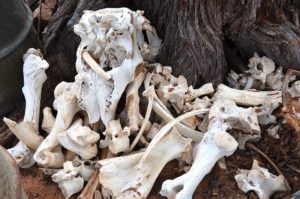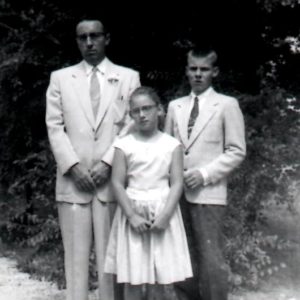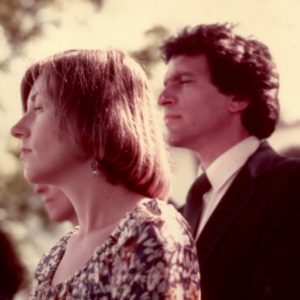Anxious memories broke into consciousness when I was almost three. They stuck like glue. The article “Memories of Trauma Are Unique because of How Brains and Bodies Respond to Threat” by Jack Debieck explains how the body’s heightened reactions, especially as a child, turned threat into embodied memory. I’d learned similar lessons from Robert Bosnak’s Embodied Dream Work. Of course, I knew none of this as a girl.
I was never physically or sexually abused and no one I loved tried to hurt me, but still those traumatic memories stayed. Many of you have more difficult examples, but my first memories were about threats I didn’t understand. Most were about helplessness and the fear of death that filled my childhood home.
 I remember Daddy in a big hospital bed. I was confused and alarmed as I touched the white sheets. Around that time, Mommy lay face down on a pew in a hospital chapel, sobbing into her arms. I saw rays of colored light from stained glass windows bathing the world with hope, but hope couldn’t erase the fear.
I remember Daddy in a big hospital bed. I was confused and alarmed as I touched the white sheets. Around that time, Mommy lay face down on a pew in a hospital chapel, sobbing into her arms. I saw rays of colored light from stained glass windows bathing the world with hope, but hope couldn’t erase the fear.
Daddy was dying, whatever that meant. Grown-ups whispered, trying to hide the truth from the hyper-alert children. Mommy collapsed on the tile bathroom floor, sobbing into her arms and hiding her face.
“What’s wrong, Mommy?” This time, I cried, too.
She faked a smile. I wasn’t fooled. I remembered her helpless sobs even though Daddy lived.
I had eye surgery at five. A mask pressed against my face drowning me with saccharine ether nausea. Huge white bones fell from above, burying me in a death dream. I woke up blind, my arms tied down.
“They took out my eyes, Daddy.” My heart pounded with terror.
“Lanee, the doctors bandaged your eyes. They tied your hands so you wouldn’t tear the bandages off. You’re OK.” I believed him. I trusted him. He didn’t lie.
At 9, a burst of memories when Grandpa died. I didn’t see him dead, but grownups said he was. For nights after his funeral, Grandpa talked to me from somewhere above my bed. Sweet and reassuring, but gone. I learned that people disappear.
We moved to Michigan when I was 12 and Daddy was too sick to run his business. He had a degenerative kidney disease and had long outlived doctor’s predictions.
At 14, I tried to say goodbye to him in his white hospital bed, but I cried and ran away. No one came for me. No one said it was OK to cry. The next time I saw Daddy, he was in a coffin with a waxy face. I tried to talk to him that night the way I’d talked to Grandpa five years earlier, but there was no answer.
Memory captured more than trauma after that, but the dark threatening times of descent and helplessness were fixed in memory. I never forgot the ether dream or Daddy in a coffin. The memories were embedded in my body and heart.
After meeting Vic when I was 22, we shared each other’s stories and soothed each other’s fears until those last few years of cancer, suffering, and death in 2008. By then, I had tools to help with loss including dream exploration, Jungian psychology, teachers like Marion Woodman, and friends who understood the process of descent. Mythological stories of descent like Persephone and Daphne helped me trust the experience.
Like those early persistent childhood memories, Vic’s suffering and death became embodied and unforgettable. After his death, he lived within me as a constant but somehow bearable heartache. He visited in my dreams, bringing meaning to my fragmented life. By then, I trusted I could descend and rise again.
***
I’m curious about other people’s early memories. Are your first memories traumatic, affirming, or a mix? It could be that I’m a Persephone type, one who descends to the Underworld, but I think my experience is common. Fear brings bursts of waking consciousness and remains in memory. For another article about Descent, see Descending into Darkness with Persephone.
I’m giving a workshop called “Finding Wisdom in Aging and Loss” for the Jung Association of Central Ohio in Columbus on May 17-18. I’ll talk about personal experiences of descent, but focus on examples from ancient mythological stories. Follow the link for details.




Dear Elaine, Thank you so much for sharing your deep memories (in word and image) and the wisdom you’ve gained from your numerous and numinous encounters with death and descent in life. I agree, persistent memories don’t just go away, as you say, they become embodied and embedded, and for myself, usually fall into two camps of experience, either when terrified or when experiencing something, often transcendental, like astral projection.
Death and descent visited you early in life, much earlier than most with the sad passing of your dearly loved father. The weeping and whispering of those unwell years must’ve been strange and immensely confusing to a child, then teenager. I can relate to ‘threats’ that you didn’t understand and how helplessness becomes fixed in our memory … so much so, that poetry and writing became the fork and spade I needed to excavate myself out of dark Hades.
When you write of your brave ability to descend and rise again, it makes me want to weep. For descending life’s spiral staircase is gruelling and heart-breaking, beyond words! Always, I’m reluctant to descend and often I will avoid doing so for as long as possible … but inevitability, the descent always catches up with me and surrender becomes my own recourse. There is so much richness and courage to digest here, and deserves much thought and reflection. In soul, Deborah.
Deborah, this post required so much wrestling (not a good sign). After it was posted, of course, I saw a way to make it work better and link the experiences with the message I was after. Sometimes the memories come first (as in this case) and sometimes the message comes first–and I posted on schedule. Such is the world of blogging deadlines and my desire to make each post mastter. I didn’t include the transcendental moments. I’ve written about some of them, but they were rare when I was a child. I didn’t include many experiences of descent throughout my life. I think the word or idea I needed was “Initiations.” Each small descent is a practice run and a small initiation preparing us for what’s ahead. Next time.
Those 12 years of my dad’s illness were confusing and anxious, but I didn’t feel under threat for my own body. The adults wanted to protect me, not hurt me. I realize that’s a big dividing line. I found meaning through Jungian work, dreams, and mythology, but much later. I think it’s essential to read mythology to children instead of the Disney silliness of my childhood. Guess what? Cinderella doesn’t always end up with the Prince. I’ve learned to trust the going down times and my ability to survive and learn from them. Inevitability descent catches up with us and, in the end, that final descent of the body with a mystery awaiting us. Your March poem invited a softening, but it’s wildly cold here with strong winds. No spring so far. Sending you love and light.
Thank you for your lovely words re my poem! Ha-ha! I always thought Cinderella & Snow White (or one of the seven dwarfs!) would make a more interesting match than Prince Charming! Sending much love, light and laughter back to you.
Prince Charming was a dull guy, but he had a manly jaw and probably lots of money. Maybe that was the appeal. Disney has done so much damage sanitizing fairy tales.
Captivating post Elaine. Yes, traumatic doesn’t have to be physical abuse, but I know well the torment that lived in my head growing up around feuding parents and have also dealt with a lot of sickness and death as a young teen. In those days parents had no awareness of what kids could take in, in silence. 🙂
I’ve just returned from a long winter getaway. Have you had the implants yet?
My parents had no idea, Debby. None. It’s the way things were done in their day. My grandparents were part of the secrecy. It also depends on the child. My brother who was four years older responded by feeling distant from my dad and never trusting the love. As I wrote this, I thought of people like you who had true psychological abuse or those who dealt with sexual and physical abuse. I’m sorry you are not in warm Mexico. You needed to stay a few weeks longer to avoid this bitter cold. I had surgery and it went well. Audio goes on March 18. It’s a long recovery process because there’s swelling in the inner ear, but I’m a little stronger every day.
So true Elaine. Every child reacts and absorbs differently. My brothers retreated into themselves. I’m so grateful I’m a vocal, inquisitive person. I was always seeking answers for the things I knew but wasn’t supposed to. Nothing much has changed with my zest for finding answers for everything. 🙂
No, I’m home for 2 weeks now. It’s cold but nothing like I heard we missed here – unbearably cold and wicked storms. I’m feeling an early spring this year so I’m optimistic and so grateful I missed the brunt of winter. Oh, I did see some beautiful butterflies while in Mexico.
I’m thrilled you had the surgery and in healing mode. I just came from your recent blog post so I know you’re already hearing, since yesterday was the 18th! Sending you lots of healing light. <3
Debby, it’s very different from natural hearing, but it’s not terrible and it doesn’t make me cringe. It’s just new and odd. I’m trying to stay curious as this unfolds. I’ll slowly become accustomed to it and the brain will know how to interpret what it’s hearing. It can take months to adjust. Meanwhile I feel hunger to be strong again and wait for the day when I can say I hear well. For now, I’m grateful for the remaining hearing in my R ear to help me through the transition. I’m grateful I haven’t had vertigo since the day before surgery. Adjustment may go on for a while, but it will bore us both quite soon.
It’s spring! The Monarch migration has reached Texas and populations are high so far. There’s also a butterfly comeback in California. I saw flocks of robins yesterday. Bluebirds should arrive any time. And you, a Canadian snowbird, are back from your winter migration to Mexico.
Your writings always inspire me, Elaine. Thank you for all that you share.
Thank you, Anne. It helps me to know this matters to you.
It’s interesting how the body knows stress, sometimes even before the brain recognizes it. At crucial moments in my memoir writing, I developed an arm rash that persisted for a while. Last week, an eye twitch developed for some reason. It lasted only a few days, thank goodness.
Like you, I have memories of the black mask sending me into unconsciousness before my tonsillectomy as a 7-year-old. I also have memories of a father who was not as benevolent as the impression I get of yours. My memoir uncovers some secrets.
Constructing this blog post must have been a bittersweet experience. Therapeutic too, perhaps. When I read about Vic, I remembered a poem I read not too long ago in PoemHunter. If you like the print version, there is an audio accompaniment. You are a month out from surgery and perhaps your brain/ear connection is growing stronger: https://www.poemhunter.com/poem/on-the-death-of-the-beloved/
Peace and joy today, Elaine!
Thank Goodness the symptoms didn’t linger. Writing memoir revisits the good and hard parts of life. My dad was benevolent and I was fortunate. It’s interesting to me that my brother didn’t experience him in the same positive light, maybe because my dad was gone in the war in the 1st four years of my brother’s life and he imprinted on my maternal Grandpa where he and my mom lived during WWII. My brother felt he was detached and not engaged as a dad. (I knew even as a child that this was because he was so sick.)
I’ll save the poem to listen later, but can read now. They first do the surgical implant with all sorts of bionic gizmos settling in behind and above my ear and in the inner ear, but wait 6 weeks for all swelling to resolve before audio goes on. I’ll have audio on March 18. It sounds like I’m in for a big and often exhausting adventure as the brain adjusts to hearing again. In time, people adjust well–some quickly and some over many months. Right now, I still have my feeble R ear which has poor hearing with the help of a hearing aid, but better than nothing. Thanks again for the poem. I’m on my way to read it. Peace and joy to you, too, Marian. I haven’t read your blog this week, but maybe it tells me when your book will be available. It always takes much longer than we imagine.
An exquisite poem I didn’t know, Marian. Thank you. I was taken with the truth of these lines since I’ve experienced how my relationship with Vic slowly evolved from a sense of absence and outer longing to a living inner presence.
“Let us not look for you only in memory,
Where we would grow lonely without you.
You would want us to find you in presence,
Beside us when beauty brightens,
When kindness glows
And music echoes eternal tones.”
~ John O’Donohue
I’m glad you enjoyed these lines visually here.
Yes, the design people tell me not to advertise a date for my book until the typesetting is done, which is weeks/months away. Yes, it is taking longer than I imagined. Whew!
You’ll get there, Marian. I felt the same way and now I’m not even close to a book. I’ve started a few that didn’t feel right and then came the hearing chaos with its vertigo, but working on this coming workshop using mythology to talk about grief and loss inspires me. We’ll see what happens next. There needs to be such passion and purpose to create a book–as you know. Right now I have a passion to hear.
So much truth….I love you…you have already helped so many including me with this
Thank you, dear Alicia. We go up and down in this cyclic way. I’m grateful to Marion Woodman, Jungian psychology, and mythology for helping me understand this as initiations into a certain kind of wisdom. Poets know this and express it the best.
I have much to say about my trauma(s) and how I have been evolving through them. I am motivated to begin my memoir.
For now, though, I would like to know if you will ever provide that workshop in the Ithaca area.
I just don’t know, Bob. It’s possible. The Jung Society in Ohio asked me to give a workshop on aging and grief, so I’m creating something new using examples from mythology and my experience. I could give the workshop in Ithaca. I’ll begin thinking about that possibility. Thanks for the suggestion.
Hi Elaine thank you for your post. Most of us have probably experienced some sort of dark cloud hanging over them during their younger years or am I projecting? I remember a grandparent here another one there and yet another one living with us at different stages of our peripatetic lives while I was a child. In the background, in the shadows –
I have some lovely memories and sad ones too –
Good luck for the upcoming switch on. Eagerly awaiting to hear
Thanks for commenting, Susan, and for the good wishes. I’ll have sound a week from today. I have no idea what to expect since it’s so patient specific, but eventually, I plan to hear decently. Until then, I’m grateful for the small amount of hearing left in one ear so I can manage in the world.
I have good warm memories, too, and I was never abused, but the most persistent memories were points where I felt threatened and afraid and very alone. I had lots of those as a child because of my dad’s constant health crises and the family strategy of not telling the children which was common then. I absorbed the feelings of despair, desperation, and grief. Only a few of those early memories are included in this blog. From an adult perspective I see those memories as teachers showing me I can descend and find my way back to a new life. They help me understand mythological stories and also help with hospice work.
As always, Elaine, I find myself sinking into your words and finding a deep nourishment for the soul. Your reply to Deborah also resonated with me: “I’ve learned to trust the going down times and my ability to survive and learn from them. Inevitability descent catches up with us and, in the end, that final descent of the body with a mystery awaiting us.” Witnessing others demonstrating such courage allows me to dig deeper and know that I can find it in myself.
Most of my early memories, and certainly the most persistent ones, are traumatic as well. And I am inspired by what you wrote, “From an adult perspective I see those memories as teachers showing me I can descend and find my way back to a new life. They help me understand mythological stories and also help with hospice work.” The story of Persephone has been a favorite of mine for as long as I can remember, and my hospice work has been informed by all of it.
It looks like your readers can look forward to a post on initiations at some point– can’t wait! And may your initiation into the world of cochlear implant hearing in the near future be filled with many blessings.
Thank you, Anne. I have plenty of anxiety about life and the future like most everyone, but in the most intense moments I can be surprisingly calm and unafraid. In general, calm wouldn’t be a word used to describe me, but I was often described as calm by social workers and oncologists when Vic was going through crisis after crisis. Years of meditation practice came through to help.
I didn’t know the story of Persephone until I was in my late 20s. It would have helped me as a child to know goddess mythology rather than Disney. The “real” stories would have explained a lot about what was going on in my home. I wrote a long piece about India and the initiatory experiences I had there but haven’t shared that so far. I think of learning to hear again as an initiation into a new phase of life, so I’m curious about how it unfolds. Sound begins on March 18. I hope to focus on making meaning of strange sounds and polishing details of the upcoming workshop in May. My goal at the moment is not to fret about whether I’ll hear or how I’ll hear or if I’ll hear by May. I’m planning the workshop as though I’ll hear just as I do now which means a little remaining damaged hearing in my R ear, distorted and unreliable. I can still talk, so I’m preparing presentations interspersed with small group or individual exercises that won’t need my hearing. I’ve also requested excellent microphones so I can answer questions.
Hard to believe that March 18 is tomorrow, when learning to hear again begins!
Your plans for the upcoming workshop sound very sensible as well as kind to yourself–preparing for it in a way that will work regardless of how your hearing may be changing by then. I’ll look forward to reading about how it all unfolds in future posts. Sending blessings your way!
Thank you, Anne, for a double blessing. It never hurts to over-prepare. I have 2 months to do that and figure out how the new hearing system will work.
I remember being (or maybe simply feeling) alone a lot. My earliest memories, when I was maybe just three, are of rocking in my outdoor rocking horse, all alone outside the house, waiting to be brought in, watching the landscape bouncing around me, and being afraid. Around that time I also remember hiding under the table, being yelled at, ” You’re hurting the furniture, don’t hurt the furniture.” Not necessarily traumatic, these memories stuck. I’m always reminded that I am alone in this world, that it’s a scary place, and that I should be careful not to hurt things as I was prone to do.
Robin, I find it interesting to look at persistent, repeated memories when so much is forgotten. They penetrated our sense of self at the time and formed and changed us. For me, being conscious of this, changes me now and allows me to recognize these patterns as not the whole story or even objective truth about me. I know my mother loved me, but her need to fix what she saw as my physical imperfections became part of my life–that feeling that something was wrong about me, long before deafness arrived. I think many women are taught this one by their mothers. And another for me is that sense that grief is wrong, tears are wrong, it’s all shameful and shouldn’t be shown. So now I weep over every joy and sorrow and share my grief with anyone who cares to read about it. I learned another way, but that touch of shame doesn’t go away entirely. “Why aren’t you over this by now?” I still ask myself.
My dear Elaine, Thank You for the share of your childhood’s memory and sorry for my delayed comment; I’m working all through the week and the job is so full of stress that empties my brain!! As I quest my muddle memories, I find no very traumatic fear only of cockroaches or dentist which I overcome them through ageing but to affect the trauma, I can tell a long story… maybe sometime I would write it and share in public.
Have a wonderful weekend
Thank you, Aladin. Because I’m curious about your world and your experiences which I assume are different from mine, I look forward to that long trauma-related story and look forward to knowing more. I’m glad you’ve grown out of childhood traumas. Sometimes that happens but sometimes they keep surfacing. I send the same good wishes to you.